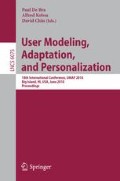Abstract
When a quantitative student model is constructed, one of the first tasks to perform is to identify the domain concepts assessed. In general, this task is easily done by the domain experts. In addition, the model may include some misconceptions which are also identified by these experts. Identifying these misconceptions is a difficult task, however, and one which requires considerable previous experience with the students. In fact, sometimes it is difficult to relate these misconceptions to the elements in the knowledge diagnostic system which feeds the student model. In this paper we present a data-driven technique which aims to help elicit the domain misconceptions. It also aims to relate these misconceptions with the assessment activities (e.g. exercises, problems or test questions), which assess the subject in question.
Access this chapter
Tax calculation will be finalised at checkout
Purchases are for personal use only
Preview
Unable to display preview. Download preview PDF.
References
Mayo, M., Mitrovic, A.: Optimising ITS Behaviour with Bayesian Networks and Decision Theory. International Journal of Artificial Intelligence in Education 12, 124–153 (2001)
Self, J.A.: Bypassing the intractable problem of student modeling. In: Frasson, C., Gauthier, G. (eds.) Intelligent Tutoring Systems: at the Crossroads of Artificial Intelligence and Education, pp. 107–123. Ablex, Norwood (1990)
Holt, P., Dubs, S., Jones, M., Greer, J.: The state of student modelling. In: Greer, E.J.E., McCalla, G. (eds.) Student modelling: The key to individualized knowledge-based instruction, vol. 125, pp. 3–35. Springer, New York (1994)
Brown, J.S., Burton, R.R.: Diagnostic models for procedural bugs in basic mathematical skills. Cognitive Science 2, 155–192 (1978)
Brown, J.S., VanLehn, K.: Repair theory: A generative theory of bugs in procedural skills. Cognitive Science 4, 379–426 (1980)
Baffes, P., Mooney, R.: Refinement-Based Student Modeling and Automated Bug Library Construction. International Journal of Artificial Intelligence in Education 7(1), 75–116 (1996)
Sleeman, D., Hirsh, H., Ellery, I., Kim, I.: Extending domain theories: two case studies in student modeling. Machine Learning 5, 11–37 (1990)
Sison, R., Numao, M., Shimura, M.: Multistrategy Discovery and Detection of Novice Programmer Errors. Machine Learning 38, 157–180 (2000)
Han, J., Kamber, M.: Data Mining: Concepts and Techniques. Academic Press, USA (2001)
Agrawal, R., Imielinski, T., Swami, A.: Mining Association Rules Between Sets of Items in Large Databases. In: SIGMOD Conference, pp. 207–216 (1993)
Witten, I.H., Frank, E.: Data Mining: Practical Machine Learning Tools and Techniques, 2nd edn. Morgan Kaufmann, San Francisco (2005)
Romero, C., Ventura, S.: Educational Data Mining: A Survey from 1995 to 2005. Expert Systems with Applications 33(1), 135–146 (2007)
Baker, R.S.J.D., Yacef, K.: The State of Educational Data Mining in 2009: A Review and Future Visions. Journal of Educational Data Mining 1(1), 3–17 (2009)
Mislevy, R.J., Almond, R.G., Lukas, J.F.: A Brief Introduction to Evidence-Centered Design., CSE Report 632, National Center for Research on Evaluation, Standards and Student Testing (CRESST) (May 2004)
Shute, V.J., Graf, E.A., Hansen, E.: Designing adaptive, diagnostic math assessments for individuals with and without visual disabilities. In: PytlikZillig, L., Bruning, R., Bodvarsson, M. (eds.) Technology-based education: Bringing researchers and practitioners together, pp. 169–202 (2005)
Greer, J.E., McCalla, G.: Granularity-based reasoning and belief revision in student models. In: Greer, J.E., McCalla, G. (eds.) Student Modelling: The Key to Individualized Knowledge-Based Instruction, vol. 125, pp. 39–62. Springer, New York (1994)
Schank, R.C., Cleary, C.: Engines for Education. Lawrence Erlbaum Associates, Hillscale (1994)
Reye, J.: A belief net backbone for student modelling. In: Cerri, S.A., Gouardres, G., Paraguacu, F. (eds.) ITS 2002. LNCS, vol. 2363, pp. 596–604. Springer, New York (2002)
Guzmán, E., Conejo, R., Pérez-de-la-Cruz, J.L.: Improving Student Performance Using Self-Assessment Tests. IEEE Intelligent Systems 22(4), 46–52 (2007)
Guzmán, E., Conejo, R., Pérez-de-la-Cruz, J.L.: Adaptive Testing for Hierarchical Student Models. User Modeling and User-Adapted Interaction 17, 119–157 (2007)
Author information
Authors and Affiliations
Editor information
Editors and Affiliations
Rights and permissions
Copyright information
© 2010 Springer-Verlag Berlin Heidelberg
About this paper
Cite this paper
Guzmán, E., Conejo, R., Gálvez, J. (2010). A Data-Driven Technique for Misconception Elicitation. In: De Bra, P., Kobsa, A., Chin, D. (eds) User Modeling, Adaptation, and Personalization. UMAP 2010. Lecture Notes in Computer Science, vol 6075. Springer, Berlin, Heidelberg. https://doi.org/10.1007/978-3-642-13470-8_23
Download citation
DOI: https://doi.org/10.1007/978-3-642-13470-8_23
Publisher Name: Springer, Berlin, Heidelberg
Print ISBN: 978-3-642-13469-2
Online ISBN: 978-3-642-13470-8
eBook Packages: Computer ScienceComputer Science (R0)

